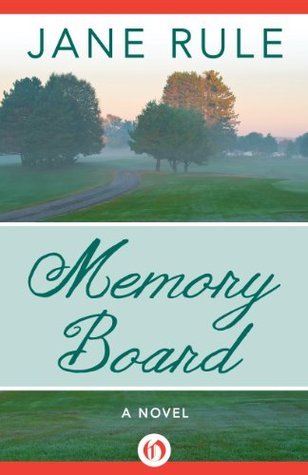Jane Rule was ahead of the curve when she published this story about sharing life with a person with memory loss. It is not dark the way the elegy about Iris Murdoch’s struggle with Alzheimer’s is, a window filmed with grime, bile, anger and fear. Instead, Memory Board is gentle and loving, so much so that I wondered if Rule succumbed to fantasy, but just as aging brings out different aspects of people, so too, must dementia.
Rule takes the reader into a warm home in which the long-term couple lead cozy lives and the blank moments are taken in stride with resourcefulness and good humor. Constance, the one who needs the memory board to manage her day, recognizes Diana and is for the time being spared the fear of having no idea who shares her bed. Both women are blessed with good sense and confident dispositions, comfortable with the relationship they have tended, at ease with the once jagged edges now smoothed by loving regard. They each possess an independent sense of self that has accommodated commitment with minimum compromise. Their golden pond is peaceful, even the presence of another romantic partner in the form of Jill, does not rock their boat.
Diana has accepted Constance’s non-monogamy and Jill has accepted the couple as a natural unit, something that leaves her free to fully inhabit being the “other woman.” There is no contest for affection here; the gals learned long ago how to share their toys.
In this Eden with a few bent trees, comes Diana’s twin brother, David. Rule has never lacked courage as a writer and she uses it here to explore David, from the inside out, amid trust issues stirred by his desire to reconnect.
The novel concerns marriage (same-sex and heterosexual), prejudice, trust, change, reliability, family and love. It focuses on what is broken and what can be repaired. Memory Board reflects the homophobia of the late 1980's. Spending time with Rule's Diana is like being invited to enjoy intelligent conversation in a flawed world that has, above all, decency and order.

